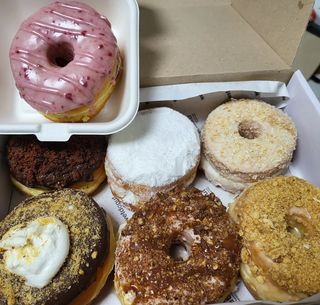We’ve all been there: groggy in the morning, eyes barely open, and reaching for that trusty cup of coffee to help wake us up. But how long does coffee actually take to kick in? The truth is, it’s not as simple as a “few minutes” answer. There’s much more going on in your body when you consume coffee. From the time it enters your system to when it reaches peak effectiveness, many factors can affect how quickly you’ll feel its energizing effects. So, let’s dive deep into the science behind your coffee fix and discover exactly what happens when you take that first sip.
Coffee: The Magic Behind the Caffeine
Coffee is the beverage of choice for millions of people around the world. Whether you prefer it black, with cream, or as a fancy iced latte, it’s the caffeine in coffee that gets you moving. But what exactly is caffeine, and how does it work?
Caffeine is a central nervous system stimulant, which means it has a direct impact on your brain, increasing your alertness and reducing the feeling of fatigue. It’s a natural compound found in coffee beans, tea leaves, energy drinks, soft drinks, and other caffeinated beverages. When you consume coffee, it doesn’t just give you a temporary boost of energy—it tricks your brain into staying awake and alert by blocking adenosine, a neurotransmitter responsible for promoting sleep.
Adenosine is like a “brake” on your brain, telling it to relax and wind down. By blocking adenosine receptors, caffeine opens the “gas pedal,” allowing stimulating chemicals like dopamine and norepinephrine to flood your brain, making you feel more awake, focused, and even a little euphoric.
So, How Long Does Coffee Take to Kick In?
The short answer: it depends.
When you consume coffee, it typically takes 15 to 45 minutes for caffeine to begin to show noticeable effects. However, the peak caffeine level—when you feel the most awake and alert—usually occurs between 30 and 60 minutes after consumption.
It’s important to note that the effects of coffee depend on several factors, including how much caffeine you consumed, your metabolism, and the time of day you drink it. While coffee may be the perfect energy booster to kickstart your day, if you drink it at the wrong time, it might interfere with your sleep later on.
Key Factors That Influence How Quickly Coffee Kicks In
Several factors influence how quickly and strongly coffee affects your body. These include:
- Milligrams of Caffeine: The amount of caffeine in your coffee is one of the most significant factors that determine how fast it will kick in. A standard 8-ounce cup of coffee contains about 95 milligrams of caffeine on average. However, the caffeine content can vary depending on factors like the type of coffee bean, brewing method, and even the brand of coffee. For instance, a tall Starbucks coffee contains nearly 150 milligrams of caffeine, while energy drinks can contain up to 200 milligrams per serving.
- Your Metabolism: Some people metabolize caffeine faster than others. Individuals with faster metabolisms may feel the stimulant effects of caffeine more quickly, while those with slower metabolisms may take longer to feel the effects. Age, genetics, and general health all play a role in how quickly caffeine is processed in your body.
- Food Intake: If you consume coffee on an empty stomach, the caffeine will likely hit you faster. However, drinking coffee with food—particularly protein or fats—can slow the absorption rate, causing the caffeine to take longer to kick in. If you’re sensitive to caffeine, eating with your coffee might help mitigate the jitteriness or upset stomach that can sometimes occur.
- Tolerance Levels: People who consume coffee regularly tend to develop a tolerance to caffeine over time. If you’re a daily coffee drinker, you might not feel the same effects as someone who only drinks coffee occasionally. In such cases, it might take longer for the caffeine to kick in, and you might need a larger dose to feel the same effects.
- Hydration: Dehydration can affect how quickly coffee kicks in. Since coffee is a mild diuretic, drinking it without sufficient water intake can cause dehydration, which may make you feel sluggish, affecting the coffee’s impact.
Peak Effects and How Long They Last
Once caffeine enters your bloodstream, its effects peak around 30 to 60 minutes after consumption. During this time, you’ll feel the most awake and alert. However, the stimulant effects don’t last forever. After the peak, the caffeine level in your body starts to decrease, and you’ll begin to feel the effects wearing off after about 4 to 6 hours.
This is why consuming coffee too late in the day can interfere with your sleep. If you drink coffee in the late afternoon or evening, the caffeine may still be active in your system hours before bedtime, making it harder to fall asleep and get restful sleep. For many people, caffeine stays in their system long enough to disrupt sleep if consumed within 6 hours of bedtime.
What Happens in Your Body After You Drink Coffee?
- Stimulating the Central Nervous System: Once caffeine enters your bloodstream, it reaches your brain and acts as a stimulant. You’ll notice increased alertness, improved mood, and a reduction in feelings of fatigue. Caffeine works by blocking adenosine receptors, which are responsible for promoting relaxation and sleep. In doing so, caffeine triggers the release of other neurotransmitters such as dopamine, which contributes to a feeling of euphoria and happiness.
- Increased Heart Rate and Blood Pressure: Another effect of caffeine is its ability to raise your heart rate and blood pressure temporarily. For most people, this isn’t a problem. However, excessive caffeine consumption can lead to heart arrhythmias or abnormal heart rhythms, especially in those with underlying heart conditions. This is one reason why healthcare providers often caution patients with cardiovascular issues to monitor their caffeine intake.
- Cortisol Levels: Caffeine also affects cortisol levels, the hormone responsible for regulating stress and energy. In the morning, cortisol levels are naturally high, which is why you might not feel the full effect of your morning coffee if you drink it right after waking up. It’s generally recommended to wait an hour or so after waking up before drinking coffee to avoid interfering with the natural cortisol spike that happens in the early morning.
- Digestive Issues: Caffeine can stimulate the production of stomach acid, which may cause gastroesophageal reflux (GERD) or an upset stomach in sensitive individuals. If you have a history of acid reflux, you may want to opt for a decaf coffee or an alternative like herbal tea.
How Much Is Too Much?
While moderate caffeine consumption has been linked to positive health outcomes, caffeine toxicity or caffeine poisoning can occur if you consume too much. The Centers for Disease Control & Prevention (CDC) and experts from Cleveland Clinic Akron General warn that too much caffeine can lead to restlessness, anxiety, rapid heart rate, and in severe cases, even life-threatening symptoms. The FDA recommends limiting caffeine intake to no more than 400 milligrams per day—about four 8-ounce cups of coffee.
For those sensitive to caffeine, decaf coffee is a good alternative. It contains only a small amount of caffeine—typically around 5 to 15 milligrams per 8 ounces—allowing you to enjoy the taste of coffee without the stimulant effects.
Checkout: How to Use a Dolce Gusto Coffee Machine
The Role of Coffee in Cognitive Momentum
Ever noticed how a good cup of coffee can keep you going through the afternoon slump? It’s all about cognitive momentum. The boost in alertness and focus can help you tackle tasks more efficiently, making coffee a popular choice for professionals in high-energy environments. Bob Ellis, a renowned psychologist at Ohio State University Wexner Medical Center, has studied how caffeine affects mental performance, showing that it can enhance short-term memory, improve problem-solving skills, and increase overall productivity.
More About: How to Grind Coffee Beans
The Risks and Rewards of Caffeine
Coffee is more than just a delicious beverage—it’s a powerful substance that has a significant impact on your body. Whether you’re a fan of Fair Trade coffee, or you prefer energy drinks, it’s important to understand the pros and cons of caffeine consumption. The evidence-based perspectives provided by the National Library of Medicine, BBC Focus Magazine, and other Trusted Sources offer valuable insight into how caffeine interacts with your body and its long-term effects on health.
Caffeine can enhance alertness, improve mood, and even boost performance. However, it’s crucial to be mindful of when and how much you consume. Moderation is key, as excessive caffeine intake can lead to various health risks such as caffeine poisoning, heart arrhythmias, and sleep disturbances.
Read More: How to Use a TASSIMO Coffee Machine ?
Conclusion: Should You Drink That Coffee?
The next time you’re reaching for a cup of coffee, remember that the effects depend on various factors, from how much caffeine you consume to your body’s individual metabolism. Whether you’re using coffee to jumpstart your day, combat a midday slump, or improve your focus, understanding how caffeine works can help you make better decisions about when and how much to drink.
For more insights on how caffeine affects your health and well-being, consider consulting healthcare providers or checking out trusted sources like the American Board of Internal Medicine, Cleveland Clinic Akron General, and the Centers for Disease Control & Prevention for evidence-based clinical decision support.
So, next time you sip your cup of coffee, you’ll have a much deeper appreciation for the science behind that energy boost—and maybe even a little fun science fact to impress your friends!
FAQs: How Long Does Coffee Take to Kick In?
It typically takes between 15 to 45 minutes for coffee to start showing noticeable effects. However, the peak caffeine level—when you feel the most alert and awake—usually occurs between 30 to 60 minutes after consumption. The exact timing varies depending on factors like your metabolism, tolerance to caffeine, and whether you consumed coffee on an empty stomach or with food.
The amount of caffeine in a cup of coffee can vary depending on factors like the type of coffee bean and brewing method. On average, an 8-ounce cup of coffee contains about 95 milligrams of caffeine. Energy drinks, however, can contain up to 200 milligrams per serving, which may have a more intense and faster effect on your body.
Yes, drinking coffee too late in the day can interfere with your sleep. Caffeine has a half-life of about 3 to 5 hours, which means it stays active in your system for hours after consumption. If you drink coffee in the afternoon or evening, it may prevent you from falling asleep, especially if consumed within 6 hours of bedtime.
Feeling jittery after drinking coffee is often due to consuming more caffeine than your body can handle or drinking it too quickly. This reaction can be more intense if you have a low tolerance to caffeine or if you’re consuming coffee on an empty stomach. Caffeine toxicity or caffeine poisoning can also cause symptoms like rapid heart rate, restlessness, and nausea if consumed in large quantities.
Yes, decaf coffee is an excellent alternative if you’re sensitive to caffeine. While decaf coffee still contains a small amount of caffeine—about 5 to 15 milligrams per 8 ounces—it’s much lower than regular coffee, making it gentler on your body. If you’re looking to avoid the stimulant effects of caffeine but still want to enjoy the taste of coffee, decaf can be a great choice.





